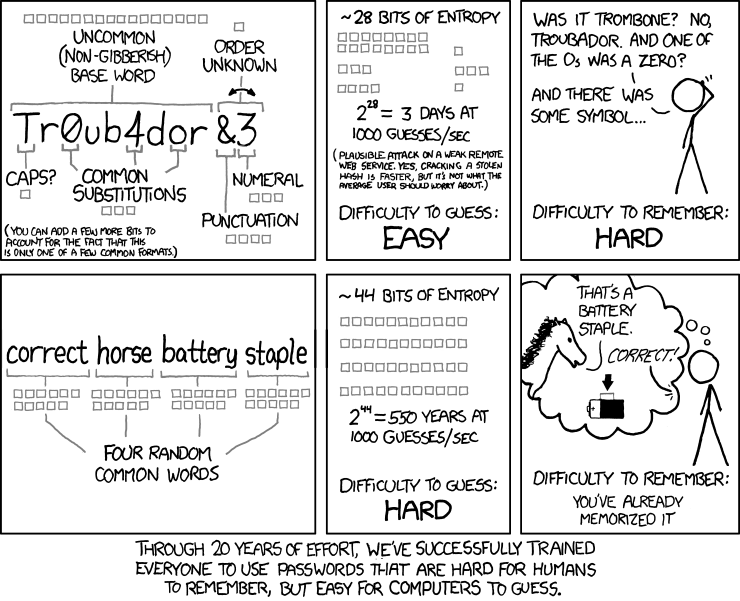Hello, habra-people! I think many people remember the bearded anecdote:
Once Valenka, a commodity specialist, went to lunch without blocking 1C.
"Kind" colleagues, just for fun, added an invoice on behalf of Valentina:
"Received: Steel handcuffs, with pink fur (BDSM) - 3 pcs, c .: 10,000 rubles, amount: 30,000 rubles."
And after that there was an audit in this office, and for a long time the inspectors tried to find out:
"Why are there pink handcuffs in the office, and where did they disappear?"
I can assume that Valentina, from the anecdote above, did not block the program because she did not remember the password, and therefore did not want to bother remembering it. And the picture below shows a way to create memorable and strong passwords. I expanded it a bit in relation to my skills.
 Password strength taken from XKCD.com .
Password strength taken from XKCD.com .
If you don't want to fall into such anecdotes and are wondering how to come up with long, fairly reliable and easy-to-remember passwords, dive under the cat.
I can assume that Valentina, from an anecdote, did not block the program because she did not remember the password, and therefore did not want to bother remembering it.
In order to make the password both difficult to guess and easy to remember (for me, of course) I came up with and for eleven years now I have been using the following simple scheme for creating / writing passwords, it is simple, since it consists of four points:
- First, we come up with a mnemonic (a phrase to remember), for example, "Seryoga is a cool hacker";
- Then we translate each of the three words into different (familiar to you) languages, it turned out like this: "Seryoga" (leave in Russian) + "Katti" (in Uzbek, I don't know the modern spelling of Uzbek, which is in Latin) + "hacker "(English);
- Further, everything that is not written in Latin - we transliterate: "Seryoga" + "qattiq" + "hacker";
- Now let's distort the text a little: "Ser # gaQat7iqX @ ker". Done.
Advantages of the method:
- There are no such combinations in any password picker I know. The parts of the password are dictionary, but words from different languages;
- Passwords are quite long, they can still be extended by inserting numbers between words;
- And most importantly, the password is easy to remember, that is, it does not need to be written out on a sticky piece of paper and glued to the monitor.
There is only one drawback: the method is suitable only for those who are familiar with several languages, moreover, it is desirable that one or two of these languages be quite rare. If you, for example, know the languages of Mansi, Khanty, Mordovian or Buryat, then you hit the jackpot: none of the password pickers I know knows about such languages! If you only know Russian, English and a few Japanese words (from the anime), then it will be much easier to find your password, since the password pickers "know" about such combinations.
Sources:
List of Rainbow Tables
Password Hit Parade
UPD: In the comments, they noted that the distortion algorithm (fourth step) is not given, I am correcting my mistake:
- / yo change to #;
- English "ch" - on "c";
- I change the first letter "h" to "x", the rest "h" - leave unchanged;
- I change the last "a" to "@";
- the second "o" -> zero "0";
- the second "t" -> "7";
- the second "s" is $.
For example: "PasswordCarol" -> "Pas $ wordC @ r0l".